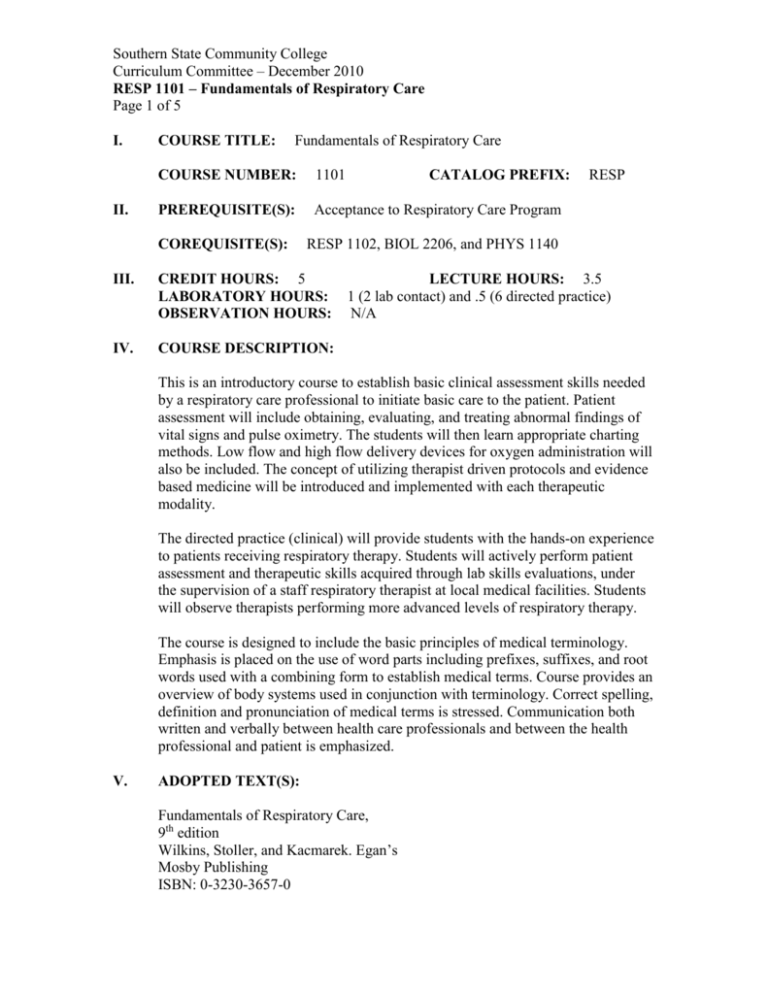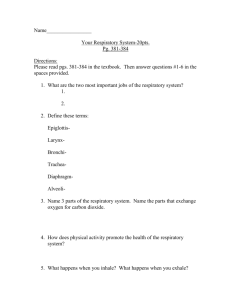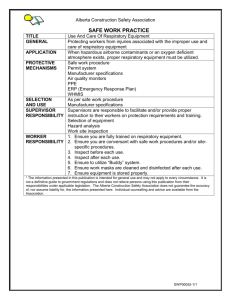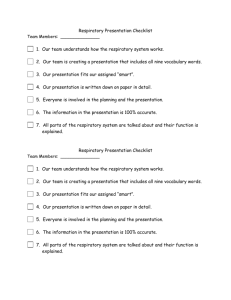RESP 1101 - Fundamentals of Respiratory Care
advertisement

Southern State Community College Curriculum Committee – December 2010 RESP 1101 – Fundamentals of Respiratory Care Page 1 of 5 I. II. COURSE TITLE: Fundamentals of Respiratory Care COURSE NUMBER: 1101 PREREQUISITE(S): Acceptance to Respiratory Care Program COREQUISITE(S): CATALOG PREFIX: RESP RESP 1102, BIOL 2206, and PHYS 1140 III. CREDIT HOURS: 5 LABORATORY HOURS: OBSERVATION HOURS: IV. COURSE DESCRIPTION: LECTURE HOURS: 3.5 1 (2 lab contact) and .5 (6 directed practice) N/A This is an introductory course to establish basic clinical assessment skills needed by a respiratory care professional to initiate basic care to the patient. Patient assessment will include obtaining, evaluating, and treating abnormal findings of vital signs and pulse oximetry. The students will then learn appropriate charting methods. Low flow and high flow delivery devices for oxygen administration will also be included. The concept of utilizing therapist driven protocols and evidence based medicine will be introduced and implemented with each therapeutic modality. The directed practice (clinical) will provide students with the hands-on experience to patients receiving respiratory therapy. Students will actively perform patient assessment and therapeutic skills acquired through lab skills evaluations, under the supervision of a staff respiratory therapist at local medical facilities. Students will observe therapists performing more advanced levels of respiratory therapy. The course is designed to include the basic principles of medical terminology. Emphasis is placed on the use of word parts including prefixes, suffixes, and root words used with a combining form to establish medical terms. Course provides an overview of body systems used in conjunction with terminology. Correct spelling, definition and pronunciation of medical terms is stressed. Communication both written and verbally between health care professionals and between the health professional and patient is emphasized. V. ADOPTED TEXT(S): Fundamentals of Respiratory Care, 9th edition Wilkins, Stoller, and Kacmarek. Egan’s Mosby Publishing ISBN: 0-3230-3657-0 RESP 1101 – Fundamentals of Respiratory Care Page 2 of 5 Fundamentals of Respiratory Care, 9th edition Wehrman. Workbook for Egan’s Mosby Publishing. ISBN: 0-3230-5188-X Medical Terminology Systems: A Body Systems Approach, 6th Edition. Gylys & Wedding. FA Davis Company, 2009 ISBN: 0-8036-2146-9 VI. COURSE OBJECTIVES: Upon successful completion of the lecture and lab portions of the course, the student will have demonstrated: 1. Demonstrate and explain universal precautions. 2. Comprehend the sterilization and infection control techniques used in health care. 3. Determine techniques of ensuring patient education through various communication methods. 4. Understand and adhere to therapist driven protocols. 5. Recognize importance of evidence based medicine. 6. Perform skills necessary to obtain vital signs. Recognize normal values of vital signs. 7. Perform and understand principles of pulse oximetry. 8. Differentiate and apply various methods of oxygen delivery and required humidity. 9. Identify all compressed medical gases and appropriate regulators. 10. Understand documentation utilized in the medical field. 11. Recognize importance of Advance Directives and how they must be followed. 12. Define and give several examples of word roots, combining forms, prefixes, and suffixes. 13. Describe how medical words are formed from word roots, combining forms, prefixes and suffixes. 14. Identify the word roots/combining forms and suffixes associated with the each body system. 15. Identify surgical, radiographic, clinical and laboratory procedures and abbreviations related to all body systems. Upon successful completion of the directed practice portion of the course, the student will have demonstrated: 1. Universal precautions as clinically indicated 2. Proper patient assessment skills 3. The skill of obtaining vital signs and recognizing normal and abnormal values RESP 1101 – Fundamentals of Respiratory Care Page 3 of 5 4. Proper technique of administering oxygen and appropriate humidification, as ordered by the appropriate personnel or as indicated per RT protocol 5. Documenting in patient’s chart as required by clinical facility VII. COURSE METHODOLOGY: Students will be required to participate in traditional lectures, group discussions, assignments, interactive proceedings, critical thinking exercises, role-playing in the human patient simulation lab, written examinations, and clinical practice. The instructor will demonstrate skills and students will be expected to return the demonstration. Competency evaluations will be utilized in the lab and clinical settings. VIII. GRADING: A = 93 – 100 B = 85 – 92 C = 77 – 84 F = 0 – 76 A final grade of at least 77% is required to pass this course. Please note that students must achieve at least a satisfactory in each lab and clinical evaluation to pass this course. If a student fails to achieve a satisfactory in lab or clinical practice, regardless of lecture grade, student will receive a grade of F for the course. IX. COURSE OUTLINE: Universal Precautions Sterilization and Infection Control Patient Education Protocols and Evidence Based Medicine Patient Assessment Basic Vital Signs Pulse Oximetry Methods of Administering Oxygen Compressed Gases Charting/Documentation Advance Directives Sample Schedule- there will be a weekly medical terminology quiz (starting week 2) Week 1- Infection Control & Sterilization Week 2- Universal Precautions & Isolation Procedures Week 3- Patient Safety Obtaining & Evaluating Basic Vital Signs RESP 1101 – Fundamentals of Respiratory Care Page 4 of 5 Performing and Charting Patient Assessment *TEST #1* Week 4- Vital Signs (continued) Pulse Oximetry Oxygen Therapy- low flow and high flow HPS Lab at CENTRAL CAMPUS Week 5- Oxygen Therapy (continued) and Bubble Humidifiers Week 6- *TEST #2* Compressed Medical Gases, Regulators/Conserving Devices, and Concentrators Week 7- Therapist Driven Protocols, Documentation, Evidence-Based Medicine, and AARC Clinical Practice Guidelines Week 8- Advance Directives Week 9- *TEST #3* HPS Lab at Central Campus Week 10/Finals Week- Patient Education and Mini Patient Scenario *Comprehensive Final Exam* The schedule is subject to change according to availability of guest speakers throughout the quarter and length of class discussion. X. OTHER REQUIRED TEXTS, SOFTWARE, AND MATERIALS: Stethoscope, wrist watch with a secondhand, scissors, and calculator. Recommended textbook: Respiratory Care Equipment 8th edition Cairo & Pilbeam. Mosby Publishing. ISBN: 0323051766 The approved uniform includes the following: a. Female students: royal blue professional uniform (scrubs), white socks, clean white tennis shoes, and photo ID badge b. Male students: royal blue professional uniform (scrubs), white socks, clean white tennis shoes, and photo ID badge RESP 1101 – Fundamentals of Respiratory Care Page 5 of 5 XI. EVALUATION: Knowledge is evaluated through written examinations, quizzes, workbook and exercises, as determined by the instructor. Additional specific evaluation requirements and the respective point values will be provided on the first day of class. Clinical practice is evaluated by student knowledge and application of that knowledge in the clinical setting. Students are to demonstrate progress toward course objectives as evidenced by specific behaviors noted in the clinical evaluation tool for this course. XII. SPECIFIC MANAGEMENT REQUIREMENTS: At the discretion of the instructor XIII. OTHER INFORMATION: FERPA: Students need to understand that your work may be seen by others. Others may see your work when being distributed, during project work, or if it is chosen for demonstration purposes. Students also need to know that there is a strong possibility that your work may be submitted to other entities for the purpose of plagiarism checks. DISABILITIES: Students with disabilities may contact the Disabilities Service Office, Central Campus, at 800-628-7722 or 937-393-3431.





